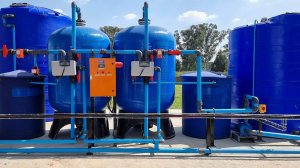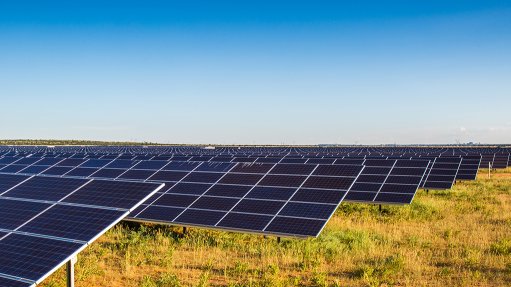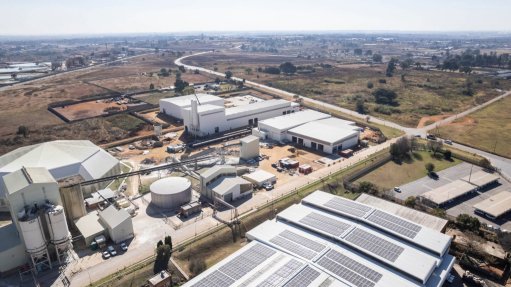Allmech demineralisation plant improves water quality at food factory
South African boiler manufacturer and water treatment component supplier Allmech has installed a demineralisation plant to treat borehole water used to supply a Gauteng-based vegetable oil extraction plant, reducing its municipal water costs.
Demineralisation plants are installed to remove dissolved solids and mineral ions from feedwater and process streams. The typical use of ion exchange is to offer near-total removal of ionic mineral contaminants.
The borehole water was initially intended to supply the factory’s boiler. A demineralisation plant was the best option to reduce the high total dissolved solids (TDS) in the borehole water to remove the need for additional boiler blowdowns.
Subsequently, Allmech’s customer decided to use borehole water to supply the entire factory instead of just the boiler. Allmech was able to change some parameters on the demineralisation plant to get closer to this requirement.
Allmech technical manager JP Thyse explains that the quality of the boiler make-up water determines the boiler operating efficiency.
“With this customer request, we designed a demineralisation plant using our new in-house programmable logic controller design, which allows customisable programming of various inputs. It also offers alarm functionality to flag when water quality isn’t up to standard, which ensures the water is not needlessly dumped through backwashing and alerts the user to potential issues.”
The second key consideration for Allmech was to determine the best control valve for this application.
“The Runxin control valves are demand-initiated controllers that allow an efficient regeneration cycle to be completed within the cation and anion vessels. Once the treated water quality reaches the set point, the system will perform a few checks and should the water remain outside specification, the plant will go into a regeneration cycle,” explains Thyse.
He says the cation vessel will regenerate first using the following sequence: backwash; acid draw and slow rinse; fast rinse; and return to service.
“Once the cation unit has completed the regeneration cycle, the anion vessel will start its regeneration following the same sequence.”
Once the anion unit has completed the regeneration cycle, the plant returns to service mode and is ready to provide treated water. Should the water quality not be within specification after the regeneration process, the unit will rinse and reassess the output quality. If the water is still not within the required specification, a second regeneration will be initiated.
Thyse mentions that he designed the plant using 48x72 FRP vessels with Runxin F77A3 Softener automatic control valves.
Tackling Challenges
“During the initial installation and commissioning, issues arose as the initial mineral water analysis changed. Investigations were carried out, tests were conducted and adjustments were made to the initial plant design, reducing the TDS and increasing the pH. We changed both the hydrochloric acid for the cation resin and the sodium hydroxide for the anion resin solution.”
Allmech initially tried different chemical ratios to regenerate the resins to help reduce backwash time to decrease the pH of the treated water more rapidly.
“But this didn’t work because it only reduced the amount of treated water that the plant could supply. The borehole water quality had changed drastically over the last year and halved the capacity of what the plant could produce from the original design specifications,” adds Thyse.
Owing to the changes in site conditions, the regeneration cycle times had to be changed to achieve maximum efficiency from the demineralisation plant.
“We realise the importance of training and maintaining the system with operating staff, showing them how to change program parameters, where to test the water and how to undertake fault finding.”
Thyse adds that it is important for customers to know that borehole water needs to be tested at least twice a year and possibly more, depending on the volumes used.
“Borehole water quality can fluctuate quite quickly and should be taken into account when doing the original assessment of the plant requirements to avoid unnecessary upgrades or required changes, owing to the change in water quality, depending on its use.”
Article Enquiry
Email Article
Save Article
Feedback
To advertise email advertising@creamermedia.co.za or click here
Comments
Press Office
Announcements
What's On
Subscribe to improve your user experience...
Option 1 (equivalent of R125 a month):
Receive a weekly copy of Creamer Media's Engineering News & Mining Weekly magazine
(print copy for those in South Africa and e-magazine for those outside of South Africa)
Receive daily email newsletters
Access to full search results
Access archive of magazine back copies
Access to Projects in Progress
Access to ONE Research Report of your choice in PDF format
Option 2 (equivalent of R375 a month):
All benefits from Option 1
PLUS
Access to Creamer Media's Research Channel Africa for ALL Research Reports, in PDF format, on various industrial and mining sectors
including Electricity; Water; Energy Transition; Hydrogen; Roads, Rail and Ports; Coal; Gold; Platinum; Battery Metals; etc.
Already a subscriber?
Forgotten your password?
Receive weekly copy of Creamer Media's Engineering News & Mining Weekly magazine (print copy for those in South Africa and e-magazine for those outside of South Africa)
➕
Recieve daily email newsletters
➕
Access to full search results
➕
Access archive of magazine back copies
➕
Access to Projects in Progress
➕
Access to ONE Research Report of your choice in PDF format
RESEARCH CHANNEL AFRICA
R4500 (equivalent of R375 a month)
SUBSCRIBEAll benefits from Option 1
➕
Access to Creamer Media's Research Channel Africa for ALL Research Reports on various industrial and mining sectors, in PDF format, including on:
Electricity
➕
Water
➕
Energy Transition
➕
Hydrogen
➕
Roads, Rail and Ports
➕
Coal
➕
Gold
➕
Platinum
➕
Battery Metals
➕
etc.
Receive all benefits from Option 1 or Option 2 delivered to numerous people at your company
➕
Multiple User names and Passwords for simultaneous log-ins
➕
Intranet integration access to all in your organisation





















